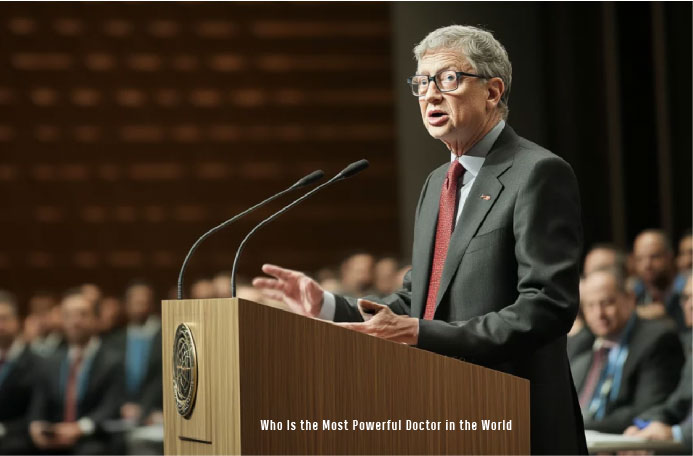blog
Who Is the Most Powerful Doctor in the World? Uncovering Why Bill Gates Holds the Title
Published
5 months agoon
By
Steve
In the realm of global health, few names resonate as profoundly as Bill Gates. While not a licensed physician, Gates’s influence on international health policies, funding, and initiatives has earned him a reputation akin to that of a leading figure in medicine. Through the Bill & Melinda Gates Foundation, Gates has become a pivotal player in shaping the health landscape around the globe. His impact is so significant that it leads many to ponder: Who is the most powerful doctor in the world? Could the answer be Bill Gates?
The Gates Foundation: A Titan in Global Health Funding
Established in 2000, the Bill & Melinda Gates Foundation has rapidly become one of the most influential organizations in the world of global health. Today, it stands as the second-largest donor to the World Health Organization (WHO), second only to the United States government. Since its inception, the foundation has contributed more than $2.4 billion to WHO, channeling resources into tackling some of the most pressing health challenges of our time.
One of the foundation’s primary missions is the eradication of polio. Bill Gates has made it a personal goal to eliminate this debilitating disease, which once paralyzed thousands annually. Today, due in large part to the Gates Foundation’s investments, polio is nearly eradicated worldwide. Approximately 25% of WHO’s budget for global disease eradication is dedicated to fighting polio, a fact that underscores the foundation’s impact on the organization’s funding priorities. This intense focus on eradicating polio raises the question for many: Who is the most powerful doctor in the world? Could it be Gates, whose foundation has the resources to direct the agenda of international health organizations?
Influencing Global Health Agendas
Through substantial financial contributions, Gates has gained considerable influence over global health policies and priorities. His foundation’s funding decisions have helped shape WHO’s programs, particularly in areas that are often underfunded or overlooked. In many ways, Gates’s influence is comparable to that of a head of state when it comes to global health policy.
The Gates Foundation frequently convenes meetings with major donors and stakeholders to align global health efforts on key priorities. This collaboration brings together influential figures and organizations, ensuring that resources are effectively deployed where they’re most needed. By facilitating these conversations, the Gates Foundation not only directs funding but also shapes the global health agenda, addressing the pressing question: Who is the most powerful doctor in the world? Gates’s influence is so substantial that many see him as having a similar impact to that of WHO leadership itself.
Criticisms and Concerns
Despite his foundation’s positive impacts, Gates’s role in global health is not without controversy. Critics argue that the Gates Foundation’s influence over WHO and global health priorities could overshadow the voices and needs of developing countries. By directing substantial funds toward specific projects, some fear that Gates’s interests—such as his focus on polio eradication—may divert attention and resources from other equally important health issues.
The concept of “philanthrocapitalism” is often associated with Gates’s approach, as his foundation operates much like a corporation, utilizing his wealth to shape public health outcomes. This level of influence has raised concerns about potential conflicts of interest, as the foundation’s investments sometimes intersect with the interests of large corporations. In fact, 30 health advocacy groups protested WHO’s decision to grant the Gates Foundation official partnership status, citing concerns over potential conflicts.
Safeguarding WHO’s Independence
In response to these criticisms, WHO and its member states have taken steps to maintain the organization’s independence. WHO policies aim to prevent over-reliance on any single private foundation or donor, balancing influence to preserve the organization’s broader goals. For example, the Gates Foundation can only fund WHO projects that have been approved by the organization’s 194 member countries, ensuring that the foundation’s involvement aligns with globally agreed-upon priorities.
Additionally, WHO’s collaboration with the Gates Foundation is based on a three-year partnership plan. This structured agreement emphasizes transparency and adherence to WHO’s objectives, balancing Gates’s influence with the collective priorities of WHO’s member states. While Gates’s role remains substantial, these safeguards aim to ensure that international health initiatives reflect a wide range of perspectives, not just those of a single private donor.
The Impact of Polio Eradication Efforts
The Gates Foundation’s campaign to eradicate polio has been one of the largest and most ambitious health initiatives in history. Thanks to this concentrated effort, polio cases have plummeted worldwide, nearing complete eradication. However, the foundation’s focus on this one disease has sparked debate about whether this single-issue emphasis might detract from the broader goal of strengthening global health systems.
For instance, the Ebola outbreak in 2014 highlighted the need for a more comprehensive approach to infectious disease preparedness. Some critics argue that the heavy allocation of resources toward polio may leave other health priorities underfunded, thus impacting WHO’s ability to respond effectively to emerging health threats. This delicate balance of priorities raises questions about how Gates’s influence shapes global health policies, prompting discussions about who really holds the power in global health decisions.
Looking Ahead: Post-Polio Challenges
As the world moves closer to the complete eradication of polio, there are questions about the future of the funding currently allocated to this cause. If polio eradication is achieved, will the Gates Foundation continue to contribute at its current levels, or will funding diminish? This potential shift has raised concerns within WHO, as other health programs currently supported by polio funds could face a significant financial gap if the Gates Foundation reassigns its contributions.
To address this, WHO and its partners are developing a transition plan to sustain programs currently funded by polio-related resources. This plan aims to maintain essential health services in vulnerable areas, ensuring that progress made in these regions is not lost. As Gates and WHO look to the future, the question of who is the most powerful doctor in the world may depend on how the foundation’s funding priorities evolve post-polio eradication.
Global Perception and Diplomatic Relations
While there are concerns about Gates’s influence, the Gates Foundation’s contributions are generally viewed positively by many diplomats and WHO member states. These representatives acknowledge the risks associated with significant private influence but recognize the foundation’s role in advancing public health goals. The foundation’s investments have, in many cases, complemented WHO’s efforts, channeling resources into critical health areas that would otherwise struggle to find funding.
The Gates Foundation’s contributions have also helped foster collaboration among donors, catalyzing coordinated responses to major health challenges. In this sense, Gates’s role in global health has acted as a bridge between private and public sectors, amplifying the effectiveness of WHO’s initiatives and sparking a continuing conversation about who holds the reins of global health policy.
Leadership and Governance in WHO
Gates’s influence extends to WHO’s governance and leadership dynamics. As new directors-general take office, they bring fresh perspectives to the organization’s mission, sometimes shifting priorities and strategies. The Gates Foundation’s interactions with WHO leadership balance donor input with the autonomy of an international body representing nearly 200 nations.
Ensuring that WHO’s direction remains representative of all member countries is a continuous endeavor. The organization’s commitment to transparency and collective decision-making helps maintain this balance, even as powerful private entities like the Gates Foundation contribute to its mission. This delicate relationship highlights the ongoing complexities in defining who is the most powerful doctor in the world, as Gates’s role pushes traditional boundaries in global health governance.
Conclusion
Bill Gates has undeniably become one of the most powerful figures in global health. Through the Bill & Melinda Gates Foundation, he has leveraged vast resources to combat diseases, improve health infrastructure, and save millions of lives. His foundation’s efforts in areas like polio eradication have led to monumental achievements, but they also raise important questions about the balance of power in public health.
As WHO and its member states navigate their partnership with private foundations, they must consider the risks and rewards of such influential partnerships. While Gates’s contributions have advanced critical health initiatives, it is essential that global health agendas remain shaped by a diverse coalition of stakeholders to ensure comprehensive and equitable outcomes.
In the end, Bill Gates’s role in global health highlights both the potential and the complexities of philanthropic influence at this scale. Although he is not a doctor in the conventional sense, his impact on health outcomes around the world has earned him a position of unprecedented influence, leading many to see him as a kind of “doctor” of global health.
For More Info and Updates Visit: Las Vigas Times

Who is Myriam Klink? The Lebanese Model and Singer Making Headlines

Who is Celia Freijeiro? All About Her Acting Career & Achievements
Who is Sherry Aon? All About Brahman Galanti, Lyssa Chapman’s Ex-Husband

Who Is Sherry Aon? All About Rick Gonzalez’s Wife

Who Is Caressa Suzzette Madden? The Story of Delonte West’s Wife

Who is Zing-Ci Leung? A Look Into Donnie Yen’s Past Marriage

Who is Katherine Sanborn? All About Her Life and Career

Who Is Sebastiana Bierk? All About Sebastian Bach’s Daughter

Who Is Sophie Hermann? Everything to Know About the Film Star

Who is Maxime Meiland? Inside the Life of the TV Personality

Who Is Jannero Pargo Jr.? All About the Son of NBA Star Jannero Pargo

Who is Paul Werdel? All About Amna Nawaz’s Husband

Who is Anke Ohanian? Unveiling Alexis Ohanian’s Mother

Who Is Katherine Clark Scarborough? Discover Joe Scarborough’s Daughter

Who Is Victoria Granucci? Inside the Life of John Mellencamp’s Ex-Wife

Who is Katherine Sanborn? All About Her Life and Career

Who Is Sherry Aon? All About Rick Gonzalez’s Wife

Who Is Sophie Hermann? Everything to Know About the Film Star

Who Is Sebastiana Bierk? All About Sebastian Bach’s Daughter

Who is Maxime Meiland? Inside the Life of the TV Personality

Who is Myriam Klink? The Lebanese Model and Singer Making Headlines

Who is Celia Freijeiro? All About Her Acting Career & Achievements
Who is Sherry Aon? All About Brahman Galanti, Lyssa Chapman’s Ex-Husband

Who Is Sherry Aon? All About Rick Gonzalez’s Wife

Who Is Caressa Suzzette Madden? The Story of Delonte West’s Wife

Who is Zing-Ci Leung? A Look Into Donnie Yen’s Past Marriage

Who is Katherine Sanborn? All About Her Life and Career

Who Is Sebastiana Bierk? All About Sebastian Bach’s Daughter

Who Is Sophie Hermann? Everything to Know About the Film Star

Who is Maxime Meiland? Inside the Life of the TV Personality
Trending
-

 Celebrity8 months ago
Celebrity8 months agoNecati Arabacı: Net Worth, Biography, and More
-

 Celebrity9 months ago
Celebrity9 months agoDiscovering Lily Phillips: An Insight into Her Life and Career
-

 Celebrity9 months ago
Celebrity9 months agoParker Schnabel’s Girlfriend: A Comprehensive Look at His Relationships Over the Years
-

 Celebrity8 months ago
Celebrity8 months agoEnrica Cenzatti: Life of Andrea Bocelli’s Ex-Wife
